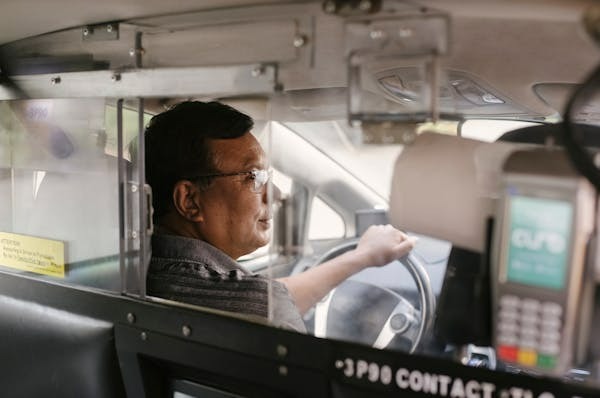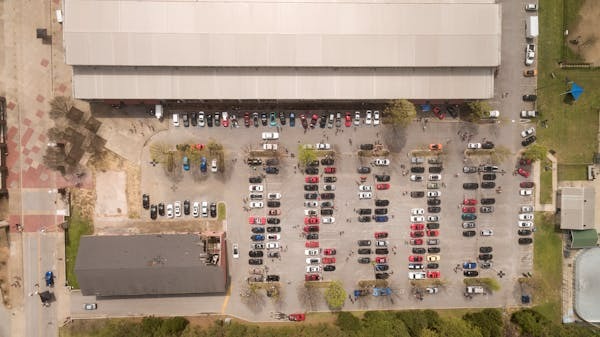Jobs have changed over the years as new technologies have removed some roles and created others. With the rise of artificial intelligence (AI), this shift is more relevant than ever, threatening to reshape the job market.
Accountants


The rise of accounting software in the past decade has made many accountants nearly obsolete as clients shift to digital solutions. What once required a qualified professional can now be done more efficiently by AI at a much lower cost.
Farm workers
Technology has now transformed farming, with drones monitoring crops and tractors operating autonomously. Today, very few aspects of modern farming function without some form of technological assistance.


Source:
mark stebnicki via pexels
Taxi drivers
Taxi drivers, once a familiar sight in the yellow cabs of New York or the black cabs of London, were a staple of city streets. However, pre-paid online services like Uber and Lyft are quickly making traditional taxis a thing of the past.


Source:
tim samuel via pexels
Train engineers
Advances in technology have reduced the need for trains to undergo the same rigorous checkups they once did. Automated systems now instantly flag issues with a train’s technology, reducing the risk of human error or oversight.


Source:
pixabay via pexels
Cashiers
Self-service checkouts offer shoppers a convenient, communication-free way to shop, and they’re becoming increasingly reliable over time. Before long, the small talk with cashiers will be a thing of the past.


Source:
imin technology via pexels
Warehouse workers
Online shopping has long surpassed traditional retail, prompting e-commerce companies to modernize their warehouse operations. Advanced robots equipped with sensors are now taking over, stocking shelves quickly and accurately with minimal errors.


Source:
elevate via pexels
Bus drivers
Bus drivers could be among the first to be replaced as driverless vehicles become common in our cities and towns. Stops will be pre-programmed, and fare payments will be handled digitally.


Source:
le minh via pexels
Admin assistants
Artificial intelligence can automate many tasks currently handled by admin assistants, such as organizing documents and updating records. While admin assistants are unlikely to be entirely out of work, their roles will likely shift to focus more on tasks like managing their managers’ calendars.


Source:
karolina kaboompics via pexels
Data entry keyers
One area where human error is least desirable is data entry. AI software is now minimizing these errors and speeding up the process, making it difficult for data entry keyers to retain their positions.


Source:
pixabay via pexels
Translators
Online translation apps once only translated words without understanding grammar or colloquialisms that could alter a sentence’s meaning. Now, AI-based tools can also translate spoken language, potentially reducing the need for human translators, who were once essential.


Source:
leeloo the first via pexels
Librarians
An increasing number of people are reading on devices like Kindle or other digital platforms. As books shift online, the demand for libraries is decreasing, putting librarians’ jobs at significant risk. Additionally, AI can efficiently manage catalog systems, further reducing the responsibilities of librarians.


Source:
Tima Miroshnichenko via pexels
Teachers
It’s difficult to envision parents trusting robots with their children’s education, so teaching is likely to remain a secure profession. However, AI will significantly transform the role by analyzing student performance, enabling teachers to offer more effective and personalized guidance.


Source:
fauxels via pexels
Fast food workers
In addition to repairing engines and dealing cards at casinos, robots may soon be cooking your meals. Automated technology will allow your order to be processed and your food prepared and served without any human involvement.


Source:
erik mclean via pexels
Postal workers
Fewer letters are being sent than ever, as most people prefer to use their phones to communicate. Even takeout menus, catalogs, utility bills, and bank statements are now available online, significantly reducing the need for postal workers.


Source:
polina tankilevich via pexels
Cleaners
Robotic vacuums are already common in homes and businesses, and soon, robots will be able to handle more complex cleaning tasks. However, due to human versatility, it’s unlikely that cleaners will become entirely obsolete; instead, they will focus on more intricate jobs that robots find challenging.


Source:
karolina kaboompics via pexels
Computer programmers
Automated coding tools are rapidly approaching the skills of the world’s top human programmers, putting their jobs at risk. While it may take time for AI to surpass the very best in the field, it has already outperformed many less experienced programmers.


Source:
mikhail nilov via pexels
Car salespeople
Today, you can find all the information you need about a car online, eliminating the need to visit a showroom. You can even buy a car online and have it delivered right to your doorstep, a convenience that wasn’t available just a few years ago.


Source:
antoni shkraba via pexels
Parking enforcement officers
The era of parking wardens may be coming to an end, as many parking lots have adopted automated registration plate technology to monitor rule violations. These systems take pictures of your car when you enter and exit, tracking how long you’ve been there and whether you’ve paid the fee.


Source:
kelly via pexels
Toll booth operators
License plate recognition software and the option to pre-pay fares through your phone have significantly reduced the need for toll booth operators. As we continue to move toward a cashless society, most payments can now be made using contactless cards, further diminishing their demand.


Source:
nothing ahead via pexels
Sport referees
Video technology is now widely used in top-level sports, initially introduced to assist referees in making tough calls. As this technology continues to improve—and in some cases, can make accurate decisions on its own—some referees may soon be viewed as unnecessary.


Source:
pixabay via pexels
Meter readers
The introduction of smart meters in modern homes is already phasing out traditional meter readers, making them unnecessary. Now, people can easily monitor their electricity usage and see how much they owe their utility company each month.


Source:
tim mossholder via pexels
Bakers
Nothing compares to homemade, freshly baked bread. However, bakers are facing decline and may become extinct in the next decade. The rise of supermarkets has not helped, as customers can now purchase baked goods while shopping for other items.


Source:
esra korkmaz via pexels
Mail sorters
Automated mail sorting machines are surpassing manual workers, allowing businesses to operate more efficiently in sorting offices. Soon, the only humans needed in the sorting room will be those responsible for turning the machines on each morning.


Source:
sasha prasastika via pexels
Coal miners
The shift away from fossil fuels is well underway, meaning coal mining will soon become an extinct occupation—if it hasn’t already. The closure of coal mines worldwide has been common since the 1980s.


Source:
Neneqo Fotógrafo via pexels
Watch repairers
Technology is driving the decline in demand for watch repairers, as many people switch to smartwatches and durable digital watches. While there will always be a need for repairing classic, high-end timepieces, watch repair shops will no longer be a fixture in every town.


Source:
Tima Miroshnichenko via pexels
Proofreaders
AI tools like Grammarly are already reducing the need for proofreaders, potentially making the occupation obsolete within a decade. However, Grammarly is still prone to errors as it’s technically in its infancy, though it has made significant progress in a short time.


Source:
vlada karpovich via pexels
Textile workers
Automated sewing machines are not only faster and more efficient than human textile workers, but they can also operate 24/7. This allows companies to produce far more than they once could with human labor alone.


Source:
hong son via pexels
Engineers
With the rise of robots and automated technology, machines can now assemble engines with remarkable ease. These machines can precisely place parts into mechanisms that once required the steady hands of skilled professionals.


Source:
kateryna babaieva via pexels
Legal secretaries
While legal professionals will still be needed for more complex tasks, AI can now handle many routine responsibilities. This will likely lead to a reduced workload and the laying off of unnecessary legal staff, such as paralegals.


Source:
August de Richelieu via pexels
Content writers
It’s hard to admit, but content writers might one day become obsolete in a world dominated by AI. However, this is still far in the future, as content generators like ChatGPT aren’t yet advanced enough to fully capture the human touch. Maybe they never will—one can hope.


Source:
suzy hazelwood via pexels
Delivery drivers
Some universities in the USA are already using robots for campus deliveries, hinting that we may see this on a larger scale soon. While there’s a big difference between a robot delivering a meal across a campus and one delivering across a city, technology is advancing rapidly.


Source:
rdne stock project via pexels
Telemarketers
Telemarketers are gradually being replaced by AI voices so advanced that you might not even realize they aren’t human. Additionally, fewer people are making purchases over the phone, thanks to the rise of online shopping.


Source:
mart production via pexels
Waste collectors
Over the last two decades, many households have reduced landfill waste as families have embraced recycling. It’s likely that waste management companies will soon invest in automated waste collection to reduce emissions and cut staff numbers.


Source:
fatih guney via pexels
Music studio engineers
Music production has increasingly shifted to digital platforms over the past decade, with advanced software now available for home use. This rise in “bedroom artists” has led to a decreased demand for studio time and the professionals who work in those studios.


Source:
pixabay via pexels
Production line workers
Henry Ford revolutionized the world by introducing assembly lines in his car manufacturing plants in 1913. However, this production method may be nearing its end. Robots can now be programmed to perform tasks that humans have traditionally done on the production line, doing so much faster and without errors.


Source:
hyundai motor group via pexels
Butchers
Butchers are facing a similar fate as bakers, as many people find it more convenient to purchase meat from supermarkets. Additionally, there has been a decline in customers as more individuals have turned to vegetarianism and veganism in recent years for environmental and ethical reasons.


Source:
ian via pexels
Prepress technicians
The decline in demand for printed press and the rise of digital publishing are leading to fewer job opportunities for prepress technicians. Self-publishing has also gained traction, with platforms like Amazon allowing less-established writers to easily publish their work online without needing physical copies.


Source:
babzillaz via pexels
Photo developers
In an era where everyone has a high-quality camera in their pocket, the role of photo developers is becoming obsolete. Photos are no longer printed as frequently, and with numerous apps available for easy editing, the demand for their editing services has also diminished.


Source:
Tima Miroshnichenko via pexels
Casino dealers
As many casinos shift their operations online, there is now a demand for casino gameplay around the clock. Instead of hiring enough dealers to cover 24/7 shifts, online casinos are seeking dealers to handle the work remotely.


Source:
javon swaby via pexels
Air traffic controllers
The role of an air traffic controller is high-pressure, as they are responsible for the safety of thousands of people each day. However, with the advent of automated runways, the future of air traffic controllers may be in jeopardy. Automated systems could also decrease the risk of fatal human errors.


Source:
magda ehlers via pexels
Please SHARE this with your friends and family.







